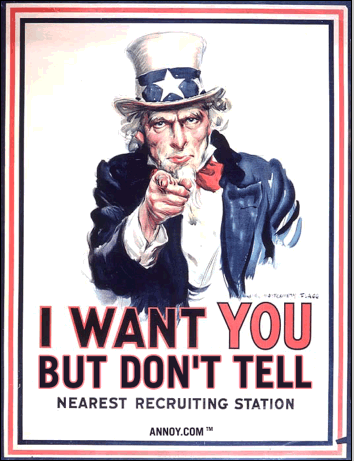Clik here to view.

Ann Coulter, the self-professed “patriot” always quick to criticize liberals calls them faggots. General Peter Pace, the fey Chairman of the Joint Chiefs of Staff, despite looking like one, (and despite his wife appearing as manly as Ann Coulter), believes he is morally superior.
This Tuesday in the Rose Garden, when asked if he concurs with General Pace’s assertion that gays are immoral, President Bush reiterated his support of the infamous “Don’t Ask, Don’t Tell” policy concerning gays in the military stating: “I will not be rendering judgment about individual orientation...I do believe the 'Don't Ask, Don't Tell' policy is good policy.”
He also thought invading Iraq on cooked intelligence was a good idea. This is what “good policy” actually looks like.
The first of many disastrous moves by President Clinton, the military's "Don't Ask, Don't Tell" policy was an unworkable compromise passed to appease bigots and avoid the real issue. (And stroke the shattered ego of the uglier, less election-worthy Southern Democrat, Sam Nunn). The military had no other choice than to admit that there were just too many gays in its ranks to argue that gays couldn't serve admirably without admitting that the military was fundamentally unprepared and ineffective as a cohesive unit.
So a flawed policy, that continues to this day, and under which more than 10 000 servicemembers have been discharged, allows an absurd charade to exist, which communicates that although the military knows that gays are rife among their ranks, they don't want to know who.
The military's "Don't Tell" provision, in essence, is designed to prevent straight servicemembers - not from the anguish of knowing that some in their unit are gay, mind you - but rather from discovering who.
The military policy makes no distinction between speech and conduct. A celibate servicemember, even a virgin, professing to be gay will be discharged for homosexual conduct. There exists a rebuttable (no pun intended) presumption that the statement alone will invariably lead to prohibited conduct, and therefore is conduct already.
The military spares no expense in both the implementation and violation of its "Don't Ask, Don't Tell" policy. Notorious for witch hunts and campaigns to weed out men and women they have spent millions of dollars preparing and training, a mere suggestion, or incorrectly interpreted glance, is enough to trigger an investigation which invariably leads to a discharge.
As President Bush’s Iraq adventure, and General Peter Pace’s stellar performance (under which Abu Ghraib occurred), continue to stretch the military so thin that the United States can no longer use the threat of force as a deterrent against countries like Iran or North Korea, scores of servicemembers are still weeded out and fired for being gay, even if they happen to be translators fluent in Arabic or Farsi, and able to actually interpret intercepted communications.
Even though the "Stop Loss"policy suspends many gay discharges during times of war -- presumably when unit cohesion and morale are the most critical, thus defeating the very purpose of the policy -- discharging servicemembers for their sexual orientation is tantamount to treason. Talk about aiding and abetting Al Qaeda's strategies.
Worse, in order to meet dismal recruiting numbers in all branches of the service, the military has lowered the standards of potential recruiters to include those who have not completed high school as well as felons. Even straight servicemembers who might have supported the “Don’t Ask, Don’t Tell” policy are proving to be allies of those in favor of lifting the ban, correctly asserting that they place a higher premium on someone who shoots straight than who is straight. Particularly if the choice is between someone who happens to be gay versus an idiot or a criminal.
But like the Abu Ghraib scandal, the rot seems to trickle down from the top. Peter Pace’s sentiments are reflected in an email message sent by Army Recruiter Sergeant Marcia Ramode to Corey Andrew, a black, openly gay, potential recruit, suggesting he “go back to Africa and do your gay voodoo limbo tango and wango dance and jump around and prance and run all over the place half naked there and practice your gay morals over there...”
In spite of the difficult and bitter war, poorly prosecuted, those that oppose openly gay servicemembers in the military (Turkey and the United States being the only NATO countries banning openly gay servicemembers) claim that the presence of openly gay soldiers constitutes a threat to unit cohesion and combat effectiveness. So rather than encouraging an environment based on trust – the essential ingredient for unit cohesion – the policy requires that a servicemember lie, even to a superior officer, if “asked” about their sexual orientation. “Don’t Tell,” means exactly what it says. Under any circumstances.
Never mind, "Don't Ask." The question we should be asking, is whether a policy designed to create liars is supposed to foster trust and bolster military readiness? Does denying truthful expression of one's core identity -- fomenting a climate of suspicion that requires lying to create a false impression that hidden truths will make any difference in a combat situation -- engender unit cohesion?
Lie, cheat, deceive or trick your comrades -- or be discharged.
Is it any wonder that this lying President thinks “Don’t Ask, Don’t Tell” a “good policy”?